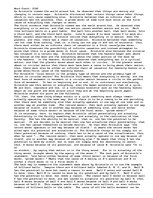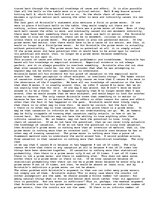As Aristotle viewed the world around him, he observed that things are moving and changing in certain ways. Aristotle discovered that certain things cause other things, which in turn cause something else. Aristotle believed that an infinite chain of causation was not possible, thus, a prime mover of some kind must exist as the first cause of everything that changes or moves.
The first evidence that Aristotle viewed was the world around him. He observed that everything is in motion, and that one motion causes another motion and so on. Much like billiard balls on a pool table. One ball hits another ball, that ball moves, hits a third ball, and the third ball moves. Like A causes B to move causes C to move etc. After careful observation, Aristotle noticed that everything is in motion, even the planets, and thus, there was a chain of causation. Aristotle believed that something can not come from nothing, that is, a thing can not pop in and out of existence, thus, there must either be an infinite chain of causation or a first cause/prime mover. Aristotle dismissed the possibility of infinite causation and instead attempted to prove that there is a prime mover or first cause. Aristotle also believed the universe was situated in a certain way. …



